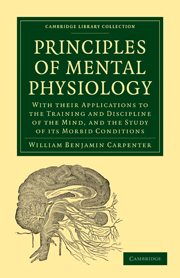 Principles of Mental Physiology
Principles of Mental Physiology Published online by Cambridge University Press: 29 August 2010
The whole of the foregoing Treatise was in type, when the Writer became acquainted with the remarkable results of the Experimental Researches which have been recently prosecuted by Dr. Ferrier into the Functions of different parts of the Brain. Of these results, some afford full confirmation of certain general doctrines set forth in the preceding pages, giving to those doctrines an unexpected definiteness and extension; others are clear additions to our previous knowledge, which are not only important in themselves, but valuable as affording a clue to further inquiry; whilst of others, again, the precise meaning seems at present obscure. As none of them, however, appear to the Writer in any way opposed to his previous teachings, he has thought it preferable, in the present stage of the inquiry, to leave these as they stand; and to give a separate account of Dr. Ferrier's results, so far as they have yet been made public, with the conclusions which they at present seem to himself to justify.
Dr. Ferrier's researches were made by the localized application of an Electric current to different parts of the Cortical substance of the Cerebrum, and, to other ganglionic centres forming part of the Brain; the animal having been previously rendered insensible by Chloroform, so that the movements excited by this stimulation may be regarded as the direct products of the physical changes it induced.
To save this book to your Kindle, first ensure no-reply@cambridge.org is added to your Approved Personal Document E-mail List under your Personal Document Settings on the Manage Your Content and Devices page of your Amazon account. Then enter the ‘name’ part of your Kindle email address below. Find out more about saving to your Kindle.
Note you can select to save to either the @free.kindle.com or @kindle.com variations. ‘@free.kindle.com’ emails are free but can only be saved to your device when it is connected to wi-fi. ‘@kindle.com’ emails can be delivered even when you are not connected to wi-fi, but note that service fees apply.
Find out more about the Kindle Personal Document Service.
To save content items to your account, please confirm that you agree to abide by our usage policies. If this is the first time you use this feature, you will be asked to authorise Cambridge Core to connect with your account. Find out more about saving content to Dropbox.
To save content items to your account, please confirm that you agree to abide by our usage policies. If this is the first time you use this feature, you will be asked to authorise Cambridge Core to connect with your account. Find out more about saving content to Google Drive.